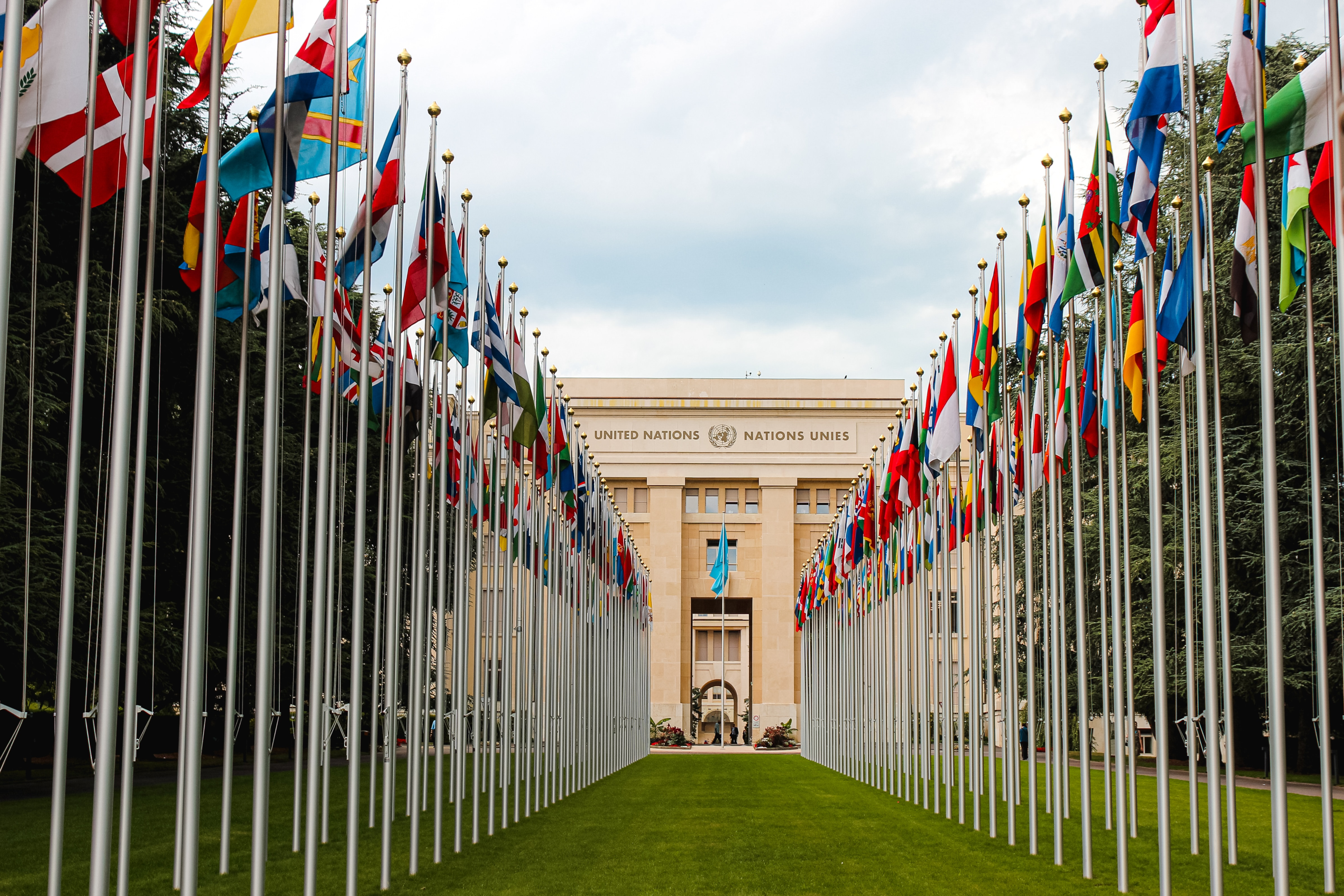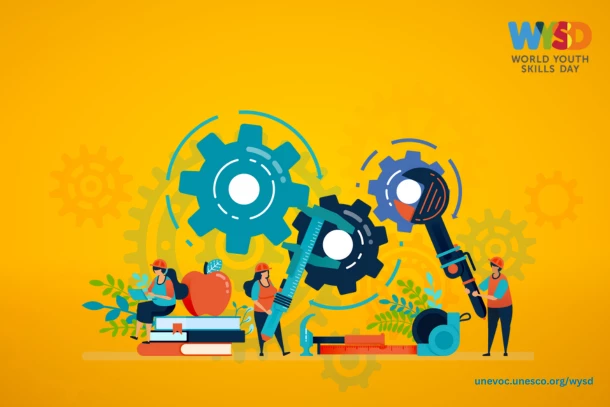World Youth Skills Day: How Do We Build the Leaders?
We all know that our next generation leaders will inherit a world very different from our own – but that doesn’t mean we can’t prepare them with the skills to manage it today.
World Youth Skills Day, a global initiative to support young workers in developing the skills and leadership mindsets needed for the future of work and civic good, is recognised by the UN because of this.
Photo by UNESCO-UNEVOC
What is World Youth Skills Day?
- “In 2014, the United Nations General Assembly declared 15 July as World Youth Skills Day, to celebrate the strategic importance of equipping young people with skills for employment, decent work and entrepreneurship”.
World Youth Skills Day “provides a unique opportunity for dialogue between young people, technical and vocational education and training (TVET) institutions, firms, employers’ and workers’ organisations, policymakers and development partners’.
In short, World Youth Skills Day is a one-stop-shop for young people to develop skills from employers and educators, both technical and vocational, worldwide, under the banner of sustainability and improvement of access to opportunity.
Transforming Youth Skills for the Future

Photo by Tim Mossholder, on Unsplash
This is prescient seeing as “600 million jobs would have to be created over the next 15 years to meet youth employment needs”. We’re on the cusp of a future of work which doesn’t yet exist and that is increasingly digital, with rapidly expanding younger generations in Africa and Asia.
The UN is leading the way in bringing technical and vocational skills and training to many millions of children and young adults who are inheriting this changing world.
This year’s World Youth Skills Day highlights the importance of teaching and a “transformative future” – how educators and communities help prepare the next generation for career building and joining the labour market.

Photo by Benjamin Davies, on Unsplash
The phrase “transformative future” is the short form for transforming youth skills for the future – indeed, the UN summarise their thinking concisely in the context of our rapidly changing digital present and how the jobs of the future will align and develop online.
- “Technological advancements and shifting labour market dynamics increasingly call for agile and adaptable skill sets. We must empower young people to navigate these changes effectively”.
With this focus on vocational skills and digital knowledge, the mission is to “(recognise) the potential of young people as catalysts for change”.
As the world and our working world change in light of AI, climate change and the rising cost of living, today’s youth and tomorrow’s leaders need to be prepared to weather whatever future changes appear.
Why Is World Youth Skills Day Important?

Photo by Mathias Reding, on Unsplash.
It’s worth highlighting two key points about why World Youth Skills Day is so important.
- “The share of youth not in employment, education or training (NEET) in 2020 – the latest year for which a global estimate is available – rose to 23.3 per cent, an increase of 1.5 percentage points from the previous year and a level not seen in at least 15 years”.
- “The youth population will grow by more than 78 million between 2021 and 2030. Low-income countries will account for nearly half of that increase”.
Within the next 20 years, the rising proportion of young people in potential leadership positions and leading labour numbers will upend the jobs market.
The fact that, as it stands, youth unemployment is rising, and the growth in younger people will be overwhelmingly located in developing or underdeveloped countries should be cause for concern.
We are at the cusp of a vast demographic wave of change, and global business leaders, the UN and more are at the forefront of leading that change.
It’s crucial that this data – and awareness days like World Youth Skills Day – fly the flag for integration, training, learning, development and skills advancement in light of a future soon to be realised.
What Are the Characteristics of Senior Skilled Leaders?

Photo by Nick Fewings, on Unsplash
- “63% of millennials believe they aren’t being fully developed as leaders by their employers for management positions”.
Even this alone should raise concerns. Given the lack of training and development that goes into upskilling Millennials, what do the leaders of tomorrow need to be like, and what traits do they need to become senior skilled leaders?
We thought we’d lean on some well-known resources to lead the way:
- “Adaptability, empathy, and contextual problem-solving” – HBR
- “Fostering trust and open communication…productivity drives their decisions…(they have) a compelling mission and vision…and a culture of clear accountability” – Gallup
- “Emotional intelligence…listening skills…establish trust…develop others…servant leadership…and be a global citizen” – LinkedIn
A large drive for World Youth Skills Day has been the establishment of social entrepreneurialism at the heart of training and youth development, alongside sustainability and civic engagement – their World Youth Reports go into granular detail about this.
So in light of this, soft skills – emotionally driven, interpersonal soft skills like problem-solving, communication and trust – are widely mandated as the key to future leadership: Skills we know that future leaders will need to realise – a future of fair access to opportunities, entrepreneurialism and career equity across the globe.
Senior Leaders Practice Diplomacy
Unsplash+In collaboration with Getty Images
- “Diplomatic skills are a range of habits, behaviours and abilities to help you manage relationships and build strong ties with colleagues in the workplace”.
Bringing together people, ideas, morals, and skills to achieve a goal or live under one roof is what diplomacy means.
Above all else, it requires collaboration and transparent communication, both essential traits of a rapidly digitising and decentralising world.
Empower Employees To Implement New Ideas

Photo by Kvalifik, on Unsplash
To empower your people takes one thing – psychological safety.
- “Psychological safety is the belief that one will not be punished or humiliated for speaking up with ideas, questions, concerns, or mistakes. In teams, it refers to team members believing that they can take risks without being shamed by other team members”.
Leaders who throw this sort of team-based safety net over their workplace will benefit from an ideas-heavy, creatively agile, fun, happy, and supported workforce.
Psychological safety is critical for everything from recruitment of people in work to ideas sharing, personal development and more. It will continue to be a central skill for leaders, especially as work becomes less focused on location, more remote, and more global.
Encourage Communication Between Leaders and Employees

Photo by Pavan Trikutam, on Unsplash
Here we revert to the servant leadership principle.
- “Leaders who follow this style include customer-facing employees in company decision-making. These employees have a close relationship with the consumer and can make better decisions to retain those customers and acquire new ones”.
What we mean by this is that the distance between the leader, worker and customer or user is made smaller.
The future decision-makers should not silo teams leagues away from product or service use but should remain on the frontline. Leaders who drop the pretence of hierarchy or power to lead with authority from data gathered in real-time from real people will be the natural inheritors of the future.
Invest in the Senior Leadership’s Ability To Champion Change

Photo by Ross Findon, on Unsplash.
In this regard, investment follows the same principle as the servant leadership principle above but superchargers it by putting money and ideas in the hands of younger leaders.
Again, silo-ing decision-making, even within leadership teams, will work to the detriment of all. Younger people need to feel empowered and part of whatever change is necessary to guarantee the health of their work, their colleagues’ careers, the success of their company and the wider environment.
They need to feel trusted enough to take ownership of organisational change – this is critically important considering how empowered Gen Z are to call organisations out on poor practices (be it internal or external).
Development of Emotional Intelligence

Photo by Tengyart, on Unsplash.
- “Emotional intelligence (EI or EQ for “emotional quotient”) is the ability to perceive, interpret, demonstrate, control, evaluate, and use emotions to communicate with and relate to others effectively and constructively”.
To lead means to be able to disagree, change opinion, urge decision-making, sacrifice, discipline, coerce, self-edit, and handle crisis and success in equal measure with maturity.
Leadership means managing people with all their foibles, emotions, clashes, and temperaments. To do this requires a unique, calm handle on emotions and an ability to read emotions in others – and communicate with others – with vigour and patience.
Self-Awareness Is Crucial for Senior Leadership Skills
Photo by Brett Jordan on Unsplash
Self-awareness is the foundational element of every leadership idea we’ve mentioned above.
The leader of the future needs to learn humility and have a constant mindset of self-improvement and self mastery, without letting the ego decide on policy.
This means a constant looking inwards, a consistent awareness that each person has something to give, something to learn, something to apply and inherent value.
But to do this requires a leader who is aware of those things in themselves, and is never shy of learning from others and recognising where they can improve.
Virtual Event – Transforming Youth Skills for the Future
A fantastic event hosted by UNESCO is a great resource for people wanting to know more about this year’s World Youth Skills Day. There is everything here from free education and training systems videos to panel discussions with Member States involving young experts, social partners, teachers and educators, and other stakeholders. Find out more here.
If you’re a graduate and/or a qualified financial student, then Send Us Your CV, or Search Jobs to find out about the roles we currently have available.
Similar posts:
Global Money Week 2022 – A Job Guide For Children And Young People, How To Build The Finance Workforce Of Tomorrow, Leadership, Finance And Empathy In The Post-Pandemic
Job Seekers
On the hunt for your next role? Upload your CV below and we’ll be in touch to discuss your requirements.
Employers
For employers seeking the right skills and cultural fit for your business, send us your vacancy to find out more about how we can help.
Submit CV Send Us Your VacancySearch Jobs
Popular this week
- What Qualifications And Skills Are Needed To Be An Accountant?
- How Does Industry 4.0 Differ From The Previous Generation?
- Agile For Accountants: Six Steps To Provide Necessary Tools And Relevant Processes
- What Are The Main Differences Between ACA and ACCA?
- What Are The Top Five Financial Accounting Facts For #AccountantsDay
